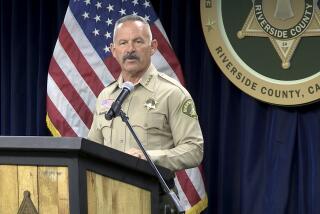Prosecution Says Miller Learned of Surveillance
- Share via
A federal prosecutor suggested Monday that former FBI agent Richard W. Miller told his boss about his involvement with accused Soviet spy Svetlana Ogorodnikova Sept. 27 only because he had learned from her the previous day that she was under FBI surveillance.
Miller, smiling nervously as he finished five days of tough questioning from Assistant U.S. Atty. Bruce G. Merritt, said he did not remember being told by Ogorodnikova Sept. 26 that she had spotted one of about 20 FBI cars that had been following her for weeks.
Merritt, producing an envelope on which Ogorodnikova allegedly wrote down the license number of the FBI car, asked Miller if he recalled going to the garage at FBI headquarters in Westwood later that day and asking about surveillance cars.
“I don’t believe I did,” Miller said. “I don’t recall doing such a thing.”
Merritt’s charge was the government’s first disclosure that it has evidence to refute Miller’s claims that he had no knowledge that he was under investigation for espionage when he told FBI superiors that he had been involved with Ogorodnikova.
As the prosecution ended its initial questioning of Miller in the trial of Svetlana and Nikolai Ogorodnikov, Ogorodnikova’s attorneys announced that they will make the same claim in their own cross-examination of the former agent.
“It is our position that Svetlana Ogorodnikova told Miller of the license number and Miller asked about the car,” said Brad D. Brian, one of Ogorodnikova’s two defense lawyers.
After relentlessly attacking Miller during his first four days on the witness stand, Merritt backed away from earlier plans to conclude his questioning Monday by asking Miller directly if he had passed secret FBI documents to the Soviet couple.
The last-minute change in strategy came after strong defense objections that the government knew Miller would deny the charge and only wanted to ask the question so that it could then further attack his credibility by introducing alleged admissions about passing documents which he reportedly made before his arrest on Oct. 2.
Decision Avoided
U.S. District Judge David V. Kenyon, who had postponed a decision on whether to permit the question, was spared the problem of deciding the difficult legal issue. While Merritt had no comment on the government’s move, sources close to the trial said the government feared that Kenyon might be subsequently reversed if he ruled in the prosecution’s favor.
The prosecution, sources said, believes it already has produced enough evidence to convict the Ogorodnikovs of conspiracy to commit espionage and does not want to jeopardize its chances of a conviction by creating a strong appeal issue.
Merritt, while refusing to discuss his reasons for abandoning the planned line of questioning, told Kenyon he remains convinced that the government has the right to ask Miller if he passed documents and will do so later in the trial if lawyers for the Ogorodnikovs “open the door at any time” by discussing the subject of passed documents.
Miller was arrested with Ogorodnikova and her husband on charges of passing secret documents to the Soviet Union in exchange for sex and money. He faces his own trial later this summer, and is testifying against the Ogorodnikovs on a court order that bans the government from using his testimony against him.
Revealing ‘Hard Facts’
He maintained Monday that his reason for telling P. Bryce Christensen, assistant special agent in charge of the FBI’s Los Angeles office, on Sept. 27 of his involvement with the Ogorodnikovs was that he finally had the “hard facts” to prove that he was trying to use them to infiltrate a Soviet KGB spy network.
Under Merritt’s questioning, Miller said the “hard facts” were that Ogorodnikova had arranged for plane tickets for herself and Miller to Vienna early in October, and that she had purchased him some new clothing, “dressing me up for the occasion.”
Merritt pointed out that Miller did not mention the new clothes to Christensen when he first told him of his activities, and asked the former agent if he had accomplished anything in the four months of his relationship with Ogorodnikova other than “totally compromising” himself as a counterintelligence agent.
“That’s what I accomplished. That was my objective,” Miller said.
More to Read
Sign up for Essential California
The most important California stories and recommendations in your inbox every morning.
You may occasionally receive promotional content from the Los Angeles Times.













